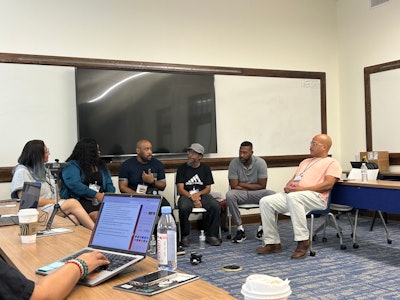As the nation celebrates five decades of hip-hop, scholars and activists gathered on Friday at Howard University to consider the relationship between academia and the musical genre. The gathering was part of a two-day convening that explored the significance of the music and its connection to activism.
"Hip Hop teaches us so many things before we are in a classroom," said Mikal Lee, a musician, and member of the Brooklyn Academy of Music. "How to dress, how to walk, how to talk, what not to do, what to eat, things like that."
He said that his introduction to political science came in the form of a Public Enemy album. Panelists at the hip-hop conference at Howard University.
Panelists at the hip-hop conference at Howard University.
"I learned more in my background and my degrees in literature and poetry from listening to Freestyle Fellowship and Nas," he said.
Lee said that hip-hop has enriched his life through the lessons he learned by listening to albums as a youngster. Still, he and many other music enthusiasts feel they need to continue advocating for academic institutions to take the art form more seriously. Over the past decade, a chorus of academicians have called on colleges and universities to do a better job of integrating hip-hop into their curriculum.
Rev. Moya Harris, a Ph.D. student studying African American preaching and hip-hop at Christian Theological Seminary, said that there is an idea that hip-hop is not respectable enough to be in academe, adding that a vast array of knowledge can be accessed if people are open to it.
Dr. David Green, an associate professor of English at Howard University was part of the push to create hip-hop studies as a minor at the historically Black university, adding that the process to get buy-in from administrators was not easy.
"There's still that negative public perception that has always plagued hip-hop," said Green. "There is a perception of it as being anti-intellectual, or the perception of it as being perhaps too vulgar, or the perception of it as not a true art in certain senses. And a number of people have debunked that. I think there's still that popular stigmatization."
Green said that he incorporates hip-hop in the classes that he teaches, adding that students examine hip-hop principals as a framework for discussing issues of inequity and activism through the lens of the musical genre.
Dr. Jason Nichols a senior lecturer at the University of Maryland College Park and editor-in-chief of the Words Beats & Life: The Global Journal of Hip-Hop Culture, said that incorporating hip-hop into academia opens the door for community members to engage with an institution and be held as experts in their field alongside credentialed professors.
It's the kind of engagement that many colleges and universities, particularly those in urban areas, say that they want to foster with the surrounding community.
Nichols said that more should be done to forge and strengthen stronger bonds between hip-hop and academia. Doing so, he adds, will inevitably center the voices of Black and Brown people.
Veronica Fernandez-Alvarado can be reached at [email protected]


















